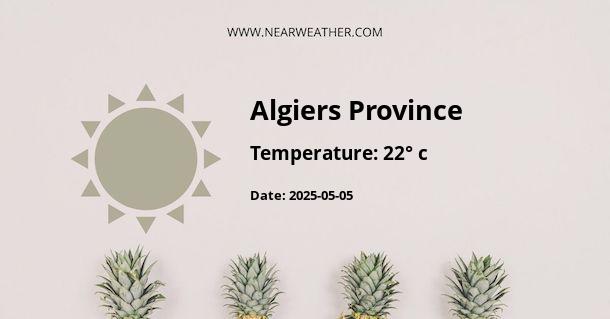Climate and Weather in Alger, DZ
Alger, also known as Algiers, is the capital city of Algeria and is located on the Mediterranean coast. The city experiences a Mediterranean climate, characterized by hot, dry summers and mild, wet winters. Let's take a closer look at the climate and weather patterns in Alger throughout the year.
Temperature
The temperature in Alger varies significantly between the summer and winter months. Summers are generally hot and can be quite oppressive due to the combination of high temperatures and high humidity. The average high temperature in July and August, the hottest months of the year, is around 32°C (90°F), with occasional heatwaves pushing the temperatures even higher.
Winters in Alger are mild compared to other parts of Algeria. The average high temperature in January, the coldest month, is around 16°C (61°F). Frost and snow are extremely rare occurrences in the city, with temperatures rarely dropping below 5°C (41°F) during the winter months.
Precipitation
Alger experiences a Mediterranean climate, which means it receives most of its precipitation during the winter months. The city sees an average of around 600 mm (23.6 inches) of rainfall annually. The wettest months are typically November through January, with December being the rainiest month, receiving an average of around 130 mm (5.1 inches) of rainfall.
During the summer months, Alger experiences little to no rainfall. The city is known for its long periods of dry spells and droughts during this time of the year. The lack of rainfall, combined with high temperatures, can lead to water scarcity and make the summer months particularly challenging for agriculture and water supply.
Sunshine
Alger enjoys a significant amount of sunshine throughout the year. The city sees an average of around 3,000 hours of sunshine annually, with the sunniest months being May through August. During these months, Alger experiences clear skies and minimal cloud cover, allowing for ample sunshine and warm temperatures.
Wind
Wind plays an important role in the climate of Alger. The city is known for its strong and persistent sea breezes, which help moderate the temperatures during the hot summer months. These breezes, known as the "Harmattan," blow from the Mediterranean Sea and provide relief from the intense heat.
In addition to sea breezes, Alger is also prone to occasional strong winds, especially during the winter months. These winds, known as "Sirocco" or "Chergui," blow in from the Sahara Desert and can bring dusty conditions and reduced visibility.
Climate Variability
The climate of Alger, like many other regions, is subject to natural climate variability. This variability can lead to fluctuations in temperature, precipitation, and other weather patterns from year to year. It is important to note that while the information provided here represents the general climate patterns in Alger, there may be variations in specific years or seasons.
Conclusion
Alger, DZ experiences a Mediterranean climate with hot, dry summers and mild, wet winters. The city enjoys a significant amount of sunshine throughout the year, with most of its rainfall occurring during the winter months. The sea breezes from the Mediterranean Sea provide relief from the summer heat, while occasional strong winds from the Sahara Desert can bring dusty conditions. Understanding the climate and weather patterns in Alger is essential for residents, tourists, and industries operating in the region.
A - Algiers Province's Latitude is 36.750000 & Longitude is 3.166670.
A - Weather in Algiers Province is 10° today.
A - Climate Conditions in Algiers Province shows light rain today.
A - Humidity in Algiers Province is 93% today.
A - Wind speed in Algiers Province is 22.21 km/h, flowing at 260° wind direction. today.
